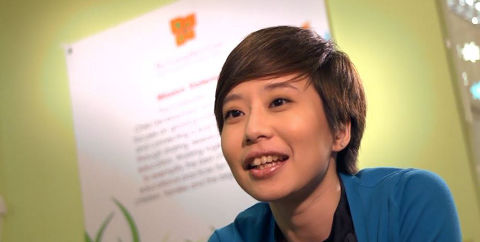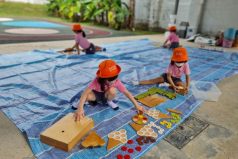What makes a teacher? The New Age Parents spoke to principals and teachers from various schools and enrichment centres, to find out more about their philosophy, passion and aspiration.
Teacher Profile
Name: Cynthia Tan
Role/Class: Principal at The Caterpillar’s Cove
Years in the industry: 4 years
TNAP: Hi Cynthia! Tell us more about yourself!
I’m the Principal of The Caterpillar’s Cove, a child study centre under NTUC First Campus located in Ngee Ann Polytechnic. I graduated as valedictorian from Wheelock College with a Bachelor of Science in Early Childhood Educational Studies and Leadership (with Honours) and joined the Cove as a teacher in 2009. I’ve been a classroom practitioner of different age groups ranging from the toddlers to Kindergartens. Currently, I manage centre operations, support the professional development of the staff, and the quality development of the centre’s curriculum.
I enjoy learning and sharing with the larger early childhood community, including through presentations at local and international conferences. I continue to be involved as a guest-speaker and facilitator in lectures and workshops for both pre and in-service early childhood professionals.
TNAP: In your eyes, what makes an effective and good teacher?
The image of a good teacher – an image I envision to continue working towards for myself too – is one who exudes passion and commitment. He/she is deeply reflective and is not afraid to admit flaws but at the same time, uses his/her strengths to enrich the profession. A good teacher places emphasis on relationships – with children, families, colleagues and the larger community, stemming from the belief that the education for young children is a complex process that involves an entire community’s efforts. A good teacher is also an advocate for children and families; he/she empathizes with their diverse intentions and finds the strengths in every family.
TNAP: Who do you look up to as a role model in terms of your teaching career and why?
I am grateful that I have crossed paths with many people, some educators and some from other professions, who have and continue to inspire me. One of them is a director of a childcare centre I was attached to for practicum during my Diploma studies. I remember being anxious and worried about the practicum experience but she was so assuring and encouraging that I knew I could turn to her for support.
As a pre-service teacher, I was able to vision how a good early childhood practitioner behaved from her modeling and interactions with children. She especially showed how to manage challenging behavior in the classroom, which at that time was extremely difficult for a young, pre-service teacher like myself, and till today I remember her gentle yet firm approach, never being judgmental, but empathic.
TNAP: Looking back in your teaching career, were there any mistakes or decisions which you regretted? If yes, how did you learn from it? If no, what are the things you think teachers can continuously strive to improve and upgrade themselves in?
I have certainly made mistakes in my career but definitely none that I regret.
My current Centre Director inspires me daily with her words of wisdom, one of which includes not being afraid to make mistakes but to take the opportunity and learn from them. Learning from my mistakes is beyond being apologetic – I take time to analyze what went wrong, the intentions of my decisions and ways I could have done better.
It can be a tiring but fulfilling reflection process where I gain insight about myself. This is possible because I work under a leader who believes that everyone needs a safe avenue to try, and in that trying will mean mistakes made but she never puts a person down for faulting but rather, challenges him/ her to do even better the next time. I do believe that as teachers, we need to consciously find pockets of time and space for ourselves even in the midst of a hectic day to ponder about the day as such reflections will keep us aware of our behaviours and their impacts especially on the children.
TNAP: Parents sometimes put teachers on a very high pedestal sometimes and expect a lot from them. What do you wish more parents knew about the teaching profession?
Working with parents and family members, I’ll like to think that their behaviours stem from the desire to provide the best for their children and as educators, we can greatly influence a child positively, or negatively. I must share that the parents and family members I work with are my driving force and affirmation to continue the work as an early educator.
My centre’s teachers and families have a mutually enriching relationship which did not happen overnight – it takes time and effort to build a relationship where both parties trust that whatever we do, it is out of good intentions for the child. I remind my teachers that we must always take the first step to establish the relationship; we know we have earned a parent’s trust not when there are no complaints, but rather when the parent feels safe enough to approach us to share the problem (especially if it is to do with the teacher or centre) trusting that we are here to work things out together.
Perhaps, what I wish for both parents and educators is to actively communicate with one another, with both parties coming to a balance of power and realize that one of the best ways to ensure a child’s success is to have the home and school in a respectful partnership.
TNAP: Complete this sentence. Teaching is…
A calling; a vocation.
If you find this article useful, do click Like and Share at the bottom of the post, thank you.
Want to be heard and seen by over 100,000 parents in Singapore? We can help! Leave your contact here and we’ll be in touch.















































Leave a Comment: